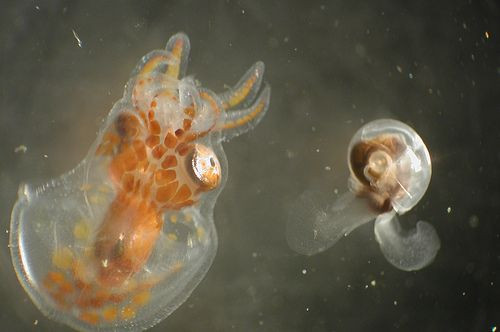Uh-Oh: Increased Ocean Acid Is Already Dissolving Animals

Researchers sampled a small area of the Southern Ocean by Antarctica and found that increased ocean acidification has dissolved the shells of some creatures. The effect could wreak havoc on the entire ocean food chain, as the animals are prey for birds and fish.
Scientists have long sounded alarms about ocean acidification. Because of the increased carbon dioxide in the air, some of it dissolves in the water in order to form carbonic acid. The carbonic acid makes the water less acidic and more basic. This change hurts creatures with hard shells that use the calcium carbonate from the water to construct them. The increased carbonic acid also means more hydrogen ions, which react with carbonate and prevent the formation of calcium carbonate.
Researchers thought that effect would take form much later, but the sample shows that it has already started in certain areas. Peteropods, small snails nicknamed "sea butterflies", use aragonite for their shells, which is particularly sensitive to the increased acidity of the ocean. It has been theorized that, by 2050, the ocean will be severely short of aragonite.
The researchers sampled a part of the ocean where upwelling occurs, which means that the wind pushes deep ocean water closer to the surface. Upwelled water is known to be particularly harsh against aragonite.
"We know that the seawater becomes more corrosive to aragonite shells below a certain depth - called the 'saturation horizon' - which occurs at around 1000m depth," lead author Nina Bednaršek said in a statement. "However, at one of our sampling sites, we discovered that this point was reached at 200m depth, through a combination of natural upwelling and ocean acidification. Marine snails - pteropods - live in this top layer of the ocean. The corrosive properties of the water caused shells of live animals to be severely dissolved and this demonstrates how vulnerable pteropods are. Ocean acidification, resulting from the addition of human-induced carbon dioxide, contributed to this dissolution."
The snails do not necessarily die as a result of the dissolution of their shells. However, it does expose them to predators and infection.
Some experts say that, in order to stave off the effects of the increased ocean acidification, we could pour megatons of limes into the ocean. However, that does not appear to be a viable option.
The study was published in Nature Geoscience.



























